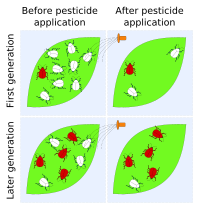
Photo from wikipedia
Abstract Insecticides and genetically modified Bt crops are the main tools for control of the fall armyworm, Spodoptera frugiperda (J.E. Smith). Since its invasion of Africa, the Far East, and… Click to show full abstract
Abstract Insecticides and genetically modified Bt crops are the main tools for control of the fall armyworm, Spodoptera frugiperda (J.E. Smith). Since its invasion of Africa, the Far East, and Australia where Bt crops are largely absent, insecticide use has increased and reduced susceptibility to several insecticides used for decades in its native distribution area have been reported. Poor efficacy at field-level is sometimes incorrectly ascribed to pest resistance, while numerous other factors influence efficacy at field-level. In this paper, we review the history of insecticide resistance in S. frugiperda and discuss the influence that life history traits, migration ecology, and chemical control practices may have on control efficacy and resistance evolution. The indirect role that poor national policies have on pesticide use practices, and indirectly on control efficacy and selection pressure is discussed. Evidence shows that local selection for resistance drives resistance evolution. Integrated pest management, rather than reliance on a single tactic, is the best way to suppress S. frugiperda numbers and the over-use of insecticides which selects for resistance.
Journal Title: Journal of Economic Entomology
Year Published: 2022
Link to full text (if available)
Share on Social Media: Sign Up to like & get
recommendations!